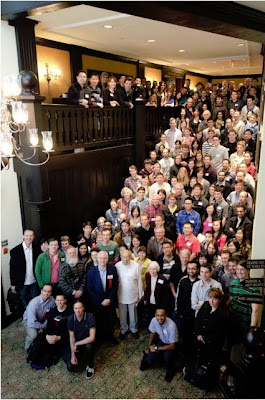Ed interviewed Ewan Birney for a story on the function of sequences in the human genome [ENCODE: the rough guide to the human genome].
According to ENCODE’s analysis, 80 percent of the genome has a “biochemical function”. More on exactly what this means later, but the key point is: It’s not “junk”. Scientists have long recognised that some non-coding DNA probably has a function, and many solid examples have recently come to light. But, many maintained that much of these sequences were, indeed, junk. ENCODE says otherwise. “Almost every nucleotide is associated with a function of some sort or another, and we now know where they are, what binds to them, what their associations are, and more,” says Tom Gingeras, one of the study’s many senior scientists.The creationists are going to love this.
And what’s in the remaining 20 percent? Possibly not junk either, according to Ewan Birney, the project’s Lead Analysis Coordinator and self-described “cat-herder-in-chief”. He explains that ENCODE only (!) looked at 147 types of cells, and the human body has a few thousand. A given part of the genome might control a gene in one cell type, but not others. If every cell is included, functions may emerge for the phantom proportion. “It’s likely that 80 percent will go to 100 percent,” says Birney. “We don’t really have any large chunks of redundant DNA. This metaphor of junk isn’t that useful.”
You blew it Ed Yong. Why didn't you ask him about the 50% of our genome containing DEFECTIVE transposons and the 2% that's pseudogenes, just for starters? Then you could ask him why he believes that all intron sequences (about 20% of our genome) are functional [What's in Your Genome?].
"Almost every nucleotide ..."? Gimme a break. Don't these guys read the scientific literature?
This is going to make my life very complicated.






























